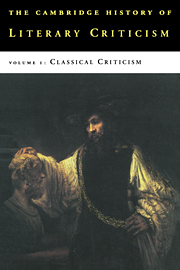Book contents
- Frontmatter
- 1 Early Greek views of poets and poetry
- 2 Language and meaning in archaic and classical Greece
- 3 Plato and poetry
- 4 Aristotle's poetics
- 5 The evolution of a theory of artistic prose
- 6 Hellenistic literary and philosophical scholarship
- 7 The growth of literature and criticism at Rome
- 8 Augustan Critics
- 9 Latin Criticism of the Early Empire
- 10 Greek Criticism of the Empire
- 11 Christianity and Criticism
- Bibliography
- Index
- References
10 - Greek Criticism of the Empire
Published online by Cambridge University Press: 28 March 2008
- Frontmatter
- 1 Early Greek views of poets and poetry
- 2 Language and meaning in archaic and classical Greece
- 3 Plato and poetry
- 4 Aristotle's poetics
- 5 The evolution of a theory of artistic prose
- 6 Hellenistic literary and philosophical scholarship
- 7 The growth of literature and criticism at Rome
- 8 Augustan Critics
- 9 Latin Criticism of the Early Empire
- 10 Greek Criticism of the Empire
- 11 Christianity and Criticism
- Bibliography
- Index
- References
Summary
Greek criticism of the first four or five Christian centuries presents a rich and diverse picture. It is not, however, one that can be complete in itself. Many of the basic concepts derive from Hellenistic or even earlier writings. The great elaborations of the rhetorical theories of types of issue (staseis) and types of style (kharaktērres, ideal) which we see, for example, in Hermogenes and his commentators, are firmly grounded in what was inherited from Hermagoras and Theophrastus and those who built on their work in the earlier period. The many attempts to discuss the relationship between literature and morals are still, in the main, a response to Plato. Furthermore, there was an important bilingual literary public - Romans who knew Greek, not Greeks who knew Latin, for these were few - and Latin literature had reached its classical acme and become a subject of study in its own right. There was thus a need to compare and contrast, to study the process of imitatio, but also to treat the two literatures as in an important sense one. In the late first and early second centuries the union seems particularly strong. Quintilian uses Dionysius' On Imitation as the source for his list of recommended reading in Greek, and the model for his corresponding advice about Latin (10.1). Aulus Gellius, reporting or embellishing the conversation of the elegant and pretentious academic circle of Antonine Athens, compares Virgil with his models in Pindar or Theocritus or Homer, and the comic poet Caecilius with his exemplar Menander.
- Type
- Chapter
- Information
- The Cambridge History of Literary Criticism , pp. 297 - 329Publisher: Cambridge University PressPrint publication year: 1990
References
- 1
- Cited by

